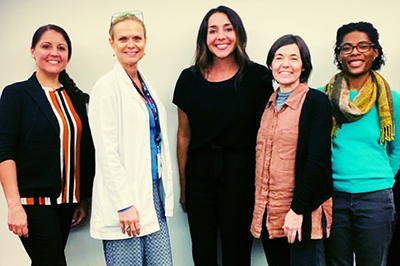UNC Medical Center first to achieve success with new Baby-Friendly Step 2 with help from the EMPower program
June 16, 2023
Patient Services Manager III Debbie Ward Gordon, MSN, RN, IBCLC, is a real hero. Working with a short timeframe, heroic best describes her leadership in getting the Maternity Care Center team at the UNC Medical Center to be the first to pass the new Step 2 of the Baby-Friendly USA (BFUSA) initiative.
“I’m determined and very goal oriented,” said Debbie. “I’m kind of a perfectionist.” It’s incredible that this accomplishment happened when they were in the middle of the COVID-19 pandemic and she didn’t have a full staff. Debbie and her team did have, however, support from the EMPower Best Practices (EMPower) program.
Train and Support

Debbie Ward Gordon (2nd from left) and EMPower’s (left to right) Chris Masterman, Julia Bourg, Kathy Parry, and Brooke Gilliam
Funded by the Centers for Disease Control and Prevention’s Division of Nutrition, Physical Activity, and Obesity, Carolina Global Breastfeeding Institute’s EMPower provides training and technical assistance to improve knowledge and skills in evidence-based maternity practices supporting optimal infant nutrition with a focus on diverse, at-risk and underserved populations.
“We provide training materials, tools and resources to help participating hospitals build a sustainable plan for achieving Step 2 of Baby-Friendly,” said Julia Bourg, BSN, RN, IBCLC, Healthcare Project Director for EMPower. “It’s essentially helping hospitals ensure staff has the skills to best support lactating families.”
The EMPower team supports the implementation of that plan through ongoing technical assistance and peer-to-peer learning opportunities. The goal of the project is to provide hospitals with the skills-based competency training to better ensure that maternity care policies and practices are implemented safely and equitably for each family.
Trust the Process
The Baby-Friendly Hospital Initiative (BFHI) is a worldwide program developed by UNICEF and the World Health Organization (WHO) in 1991. BFUSA is the accrediting body in the United States. WHO published guidelines for the BFHI Ten Steps. BFUSA bases their steps on the WHO guidelines.
The Ten Steps are endorsed by every public health and medical association worldwide on how to best support mothers, regardless of how they choose to feed their baby. Step 2 ensures that all the nurses and physicians have the knowledge and skills to support the family’s intention for infant feeding.
“Success for the hospitals is knowing the implementation of the curriculum was smooth, useful and helpful… It’s really about improving patient care and support.”— Julia Bourg, Healthcare Project Director for EMPower
“The more steps the patient experiences, the more likely they are to be successful in their intentions to breastfeed,” said Eileen FitzPatrick, DrPH, MPH, RDN, CLC, BFUSA Chief Executive Officer. “Patients know if their baby is delivered in a Baby-Friendly hospital, the staff and physicians have the knowledge and skill to support them in the early postnatal period for whatever feeding choice they make, certainly for meeting their breastfeeding intentions.”
When BFHI revised the Ten Steps in 2018 and 2020, Step 2 requirements drastically changed. EMPower developed a curriculum that essentially took the guesswork out of the process.
Build a Foundation
Step 2 is foundational because it’s hard to implement the other BFUSA elements without competent, skilled support and baseline knowledge around birthing care and infant feeding support. “When there’s that, there are better outcomes for families. You know they’re going to have better outcomes meeting their feeding goals and receive better care. Health outcomes essentially improve,” said Julia.

Eileen FitzPatrick, Baby-Friendly USA Chief Executive Officer
What does success look like for EMPower? EMPower’s goal is for each participating facility to train at least 80 percent of staff working in maternity and newborn care services using the curriculum and resources provided. We hope that the majority of hospitals in the program reaches this goal.
“Success for the hospitals is knowing the implementation of the curriculum was smooth, useful and helpful,” said Julia. “If they report training most of their staff without it being too difficult, that the curriculum was applicable to the job and the staff, and it was helpful and increased knowledge base, that’s success. It’s really about improving patient care and support.”
For the first time, physicians must also complete skills competency training with the nurses. The goal is to improve communication when providing patient care. “Doctors and providers worked together with patients,” said Debbie, “I would say at least eighty to ninety percent of the doctors left saying ‘Oh my God. I’ve learned so much. That was great.’ It was exciting to see the doctors actually putting into practice what they used in the simulation lab.”
Stay Flexible
According to BFUSA, this process typically takes three or four years to implement. Such a daunting task, Debbie gives partial credit to EMPower for helping her “turn it all around” in less than a year.
Key to EMPower’s success is flexibility with how it’s implemented. Hospitals can use what works best for their resources and their capacity. “We developed everything. It comes at no cost to them. They have everything at their fingertips. We take some of the burden off them,” said Julia.
EMPower’s organization, coaching and materials painstakingly addressed each criterion to take more than 260 people on Debbie’s team through the education. “This was extremely important, because we were under a lot of stress. EMPower made it a lot easier,” said Debbie. She also credits support from her director, managers, providers and nurses.
“It’s very impressive what they did,” said Eileen. “And, also for our other facilities to understand that Step 2 is doable for them. It’s a little overwhelming, I think, for facilities that are just starting out.”
Keep Confident
The UNC Medical Center was one of the first to really integrate EMPower. “Debbie was helpful for us too because she piloted a lot of our materials,” said Julia. “They were the first to fully implement it and they had to do it quickly.”
“I was so impressed with Debbie at UNC. She was a force of nature,” said Eileen. “Because she did a tremendous amount of work in a relatively short period of time. UNC really did a great job. They should be really proud.”
“All we have to do is keep doing what we’re doing and we’re going to be in great shape with redesignation number four,” said Debbie. “And that makes me feel really confident in what we’ve implemented.”
Robert A. Poarch
